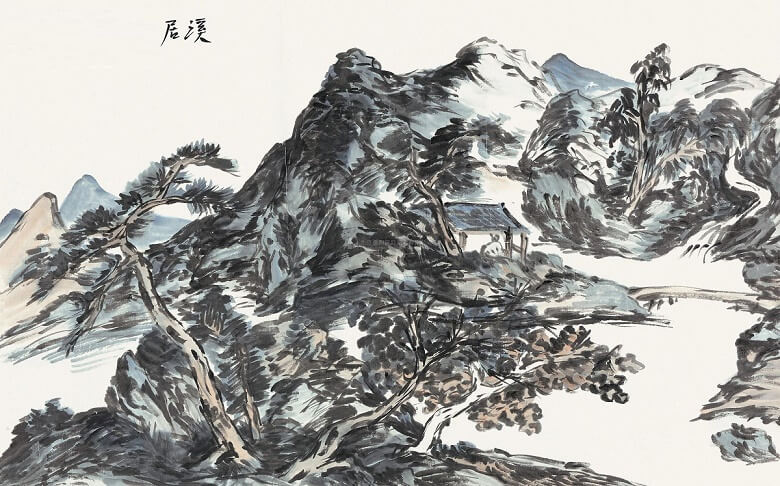Dwelling By a Stream
- Poetry of Liu Zongyuan
《溪居》

中文原文( Chinese )
久为簪组束,幸此南夷谪。
闲依农圃邻,偶似山林客。
晓耕翻露草,夜榜响溪石。
来往不逢人,长歌楚天碧。
English Translation
I had so long been troubled by official hat and robe
That I am glad to be an exile here in this wild southland.
I am a neighbour now of planters and reapers.
I am a guest of the mountains and woods.
I plough in the morning, turning dewy grasses,
And at evening tie my fisher-boat, breaking the quiet stream.
Back and forth I go, scarcely meeting anyone,
And sing a long poem and gaze at the blue sky.
Five-character-ancient-verse
· Next:At a Border-fortress
- Why Chinese poems is so special?
- The most distinctive features of Chinese poetry are: concision- many poems are only four lines, and few are much longer than eight; ambiguity- number, tense and parts of speech are often undetermined, creating particularly rich interpretative possibilities; and structure- most poems follow quite strict formal patterns which have beauty in themselves as well as highlighting meaningful contrasts.
- How to read a Chinese poem?
- Like an English poem, but more so. Everything is there for a reason, so try to find that reason. Think about all the possible connotations, and be aware of the different possibilities of number and tense. Look for contrasts: within lines, between the lines of each couplet and between successive couplets. Above all, don't worry about what the poet meant- find your meaning.
List of Chinese poets
Pre-Qin Poetry
Han poetry
Ban Gu Cao Cao Cao Zhi Cao Pi Cai Wenji Kong Rong Liu Bang Liu Che Qin Jia Ruan Ji Su Wu Wang Can Xiang Yu Xu Gan Zhang Heng AnonymousSix Dynasties Poetry
Tao Yuanming Zhang HuaTang poetry
Bai Juyi Bao Junhui Cen Shen Chen Zi'ang Cui Hao Chang Jian Cui Tu Chen Tao Du Fu Du Mu Du Shenyan Dai Shulun Du Xunhe Du Qiuniang Gao Shi Gu Kuang Gao Pian Han Yu He Zhizhang Han Hong Huangfu Ran Han Wo Huang Chao Jia Dao Jiaoran Jin Changzu Li Bai (Li Po) Li He Li Shangyin Liu Yuxi Liu Zongyuan Luo Binwang Li Qi Liu Changqing Lu Lun Li Shen Li Yu Li Qiao Li Yi Liu Fangping Liu Zhongyong Li Ye Meng Haoran Meng Jiao Ma Dai Pei Di Qian Qi Quan Deyu Sikong Shu Song Zhiwen Shen Quanqi Shangguan Wan'er Xuanzong of Tang Wang Bo Wang Changling Wang Wei Wang Zhihuan Wei Yingwu Wen Tingyun Wang Han Wei Zhuang Wang Wan Xue Tao Xu Hun Xu Hui Yuan Zhen Yu Xuanji Yu Shinan Yuan Jie Zhang Jiuling Zhang Ji Zhang Hu Zhang Zhihe Zu Yong Zhang Xu Zhu Qingyu Zheng Tian Zhang Bi Zhang RuoxuSong Poetry
Cai Xiang Chao Chongzhi Fan Chengda Fan Zhongyan Huang Tingjian He Zhu Kou Zhun Jiang Kui Lu You Li Qingzhao Liu Yong Mei Yaochen Ouyang Xiu Pan Lang Qin Guan Qian Weiyan Su Shi Su Zhe Song Qi Wang Anshi Wen Tianxiang Weng Juan Xin Qiji Yang Wanli Yue Fei Yan Jidao Yan Shu Ye Shaoweng Zeng Gong Zhang Xian Zhou Bangyan Zhu Shuzhen Zhu Xi Zhou DunyiYuan poetry
Bai Pu Guan Hanqing Ma Zhiyuan Xu Zaisi Yang WeizhenMing poetry
Chen Jiru Tang Yin Tang Xianzu Xu Wei Yu Qian Yang ShenQing poetry
Cao Xueqin He Shuangqing Nalan Xingde Pu Songling Tsangyang Gyatso Wang Guowei Yuan Mei Zheng Xie Zhao Yi